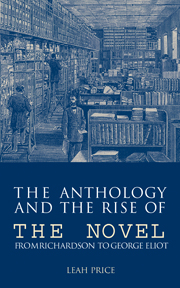Chapter 2 - Cultures of the commonplace
Published online by Cambridge University Press: 22 September 2009
Summary
The kind of anthology most familiar to academic literary critics today – delimited by nationality, arranged by chronology – was unknown in Richardson's lifetime. The anthology itself is much older, as we have seen. But the defeat of perpetual copyright in 1774 changed the use to which the form was put. Only once the legal status of earlier works came to diverge from that of new ones did English-language anthologies take on the retrospective function (and the academic audience) that they maintain today. Timely miscellanies of new works gave way to timeless gleanings from the backlist. On or about 1774, as the research of Barbara Benedict and Trevor Ross has shown, literary history became anthologists' job.
A generation of late-eighteenth-century anthologies established not only the content of the canon to date, but also the rules by which future literature would be transmitted, notably the expectation that every anthology-piece bear a signature and that its signatory be dead. Even more important than their ambition to consolidate a national tradition, however, was the near-monopoly that a few school anthologies achieved by the end of the century, allowing large numbers of schoolchildren to share the experience of reading not just the same anthology-pieces but the same anthologies.
- Type
- Chapter
- Information
- The Anthology and the Rise of the NovelFrom Richardson to George Eliot, pp. 67 - 104Publisher: Cambridge University PressPrint publication year: 2000



